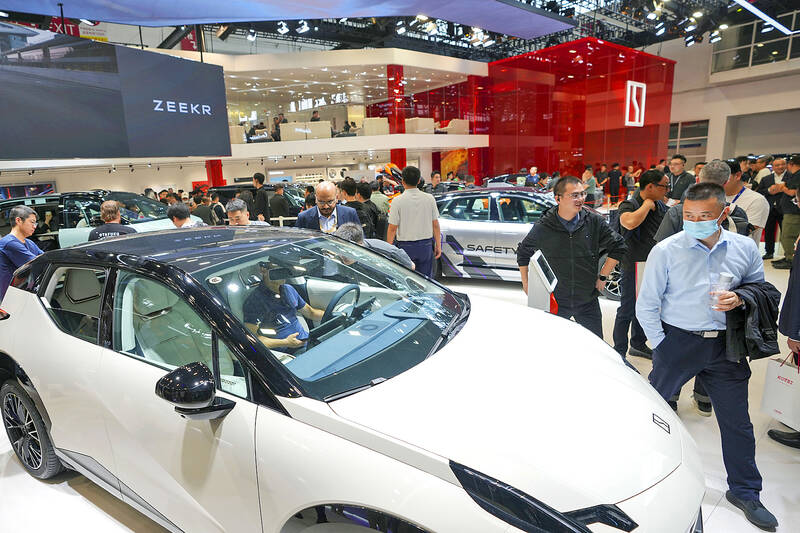The US Department of Commerce today is expected to propose prohibiting Chinese software and hardware in connected and autonomous vehicles on US roads due to national security concerns, two sources said.
US President Joe Biden’s administration has raised concerns about the collection of data by Chinese companies on US drivers and infrastructure as well as the potential foreign manipulation of vehicles connected to the Internet and navigation systems.
The proposed regulation would ban the import and sale of vehicles from China with key communications or automated driving system software or hardware, said the two sources, who declined to be identified because the decision had not been publicly disclosed.

Photo: AP
The move is a significant escalation in the US’ ongoing restrictions on Chinese vehicles, software and components. Earlier this month, the Biden administration locked in steep tariff hikes on Chinese imports, including a 100 percent duty on electric vehicles (EVs) as well as new hikes on EV batteries and key minerals.
US Secretary of Commerce Gina Raimondo in May said that the risks of Chinese software or hardware in connected US vehicles were significant.
“You can imagine the most catastrophic outcome theoretically if you had a couple million cars on the road and the software were disabled,” she said.
The commerce department plans to give the public 30 days to comment before any finalization of the rules, the sources said.
CONNECTED
Nearly all newer vehicles on US roads are considered “connected.” Such vehicles have onboard network hardware that allows Internet access, allowing them to share data with devices both inside and outside the vehicle.
The department also plans to propose making the prohibitions on software effective in the 2027 model year, while the ban on hardware would take effect in January 2029 or the 2030 model year.
The prohibitions in question would include vehicles with certain Bluetooth, satellite and wireless features as well as highly autonomous vehicles that could operate without a driver behind the wheel. The prohibitions would extend to other foreign US adversaries, including Russia, the sources said.
A trade group representing major automakers including General Motors Co, Toyota Motor Corp, Volkswagen AG, Hyundai Motor Co and others had warned that changing hardware and software would take time.
The carmakers said their systems “undergo extensive pre-production engineering, testing, and validation processes and, in general, cannot be easily swapped with systems or components from a different supplier.”
SECURITY
The commerce department declined to comment on Saturday.
Reuters first reported, early last month, details of a plan that would have the effect of barring the testing of autonomous vehicles by Chinese automakers on US roads.
There are relatively few Chinese-made light-duty vehicles imported into the US. The White House on Thursday signed off on the final proposal, which is aimed at ensuring the security of the supply chain for US connected vehicles. It would apply to all vehicles on US roads, but not for agriculture or mining vehicles, the sources said.
Biden said that most cars these days are like “smartphones on wheels,” connected to phones, navigation systems, critical infrastructure and to the companies that made them.

In Italy’s storied gold-making hubs, jewelers are reworking their designs to trim gold content as they race to blunt the effect of record prices and appeal to shoppers watching their budgets. Gold prices hit a record high on Thursday, surging near US$5,600 an ounce, more than double a year ago as geopolitical concerns and jitters over trade pushed investors toward the safe-haven asset. The rally is putting undue pressure on small artisans as they face mounting demands from customers, including international brands, to produce cheaper items, from signature pieces to wedding rings, according to interviews with four independent jewelers in Italy’s main

Macronix International Co (旺宏), the world’s biggest NOR flash memory supplier, yesterday said it would spend NT$22 billion (US$699.1 million) on capacity expansion this year to increase its production of mid-to-low-density memory chips as the world’s major memorychip suppliers are phasing out the market. The company said its planned capital expenditures are about 11 times higher than the NT$1.8 billion it spent on new facilities and equipment last year. A majority of this year’s outlay would be allocated to step up capacity of multi-level cell (MLC) NAND flash memory chips, which are used in embedded multimedia cards (eMMC), a managed

In the wake of strong global demand for AI applications, Taiwan’s export-oriented economy accelerated with the composite index of economic indicators flashing the first “red” light in December for one year, indicating the economy is in booming mode, the National Development Council (NDC) said yesterday. Moreover, the index of leading indicators, which gauges the potential state of the economy over the next six months, also moved higher in December amid growing optimism over the outlook, the NDC said. In December, the index of economic indicators rose one point from a month earlier to 38, at the lower end of the “red” light.

The global server market is expected to grow 12.8 percent annually this year, with artificial intelligence (AI) servers projected to account for 16.5 percent, driven by continued investment in AI infrastructure by major cloud service providers (CSPs), market researcher TrendForce Corp (集邦科技) said yesterday. Global AI server shipments this year are expected to increase 28 percent year-on-year to more than 2.7 million units, driven by sustained demand from CSPs and government sovereign cloud projects, TrendForce analyst Frank Kung (龔明德) told the Taipei Times. Demand for GPU-based AI servers, including Nvidia Corp’s GB and Vera Rubin rack systems, is expected to remain high,